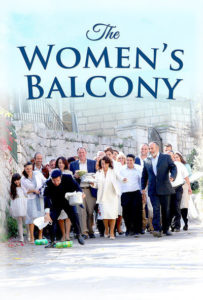 Right now is a great time for Israeli cinema. In the past month I’ve seen The Wedding Plan and Past Life, and now comes The Women’s Balcony. (And Wonder Woman Gal Gadot is an Israeli, too.) And what do they all have in common, besides speaking Hebrew? They’re all about strong women. And they’re all worth seeing.
Right now is a great time for Israeli cinema. In the past month I’ve seen The Wedding Plan and Past Life, and now comes The Women’s Balcony. (And Wonder Woman Gal Gadot is an Israeli, too.) And what do they all have in common, besides speaking Hebrew? They’re all about strong women. And they’re all worth seeing.
The Women’s Balcony takes place in a tight knit Orthodox Jewish community in Jerusalem. These friends’ and families’ lives all center around their synagogue – holidays, rites, socializing. But when the women’s balcony falls through the floor during a bar mitzvah, and the congregation suddenly has nowhere to worship, the men find a temporary space for their daily prayers and in looking for a minyan (10 men), meet the young and charismatic Rabbi David (Aviv Alush). Their own rabbi is having problems with his mental health, and Rabbi David is happy to help out, but his aid comes with a somewhat hidden agenda. He wants to take this casually Orthodox congregation and turn them into Ultra-Orthodox Jews. His first sermon to the men is about purity and how the women should be more modest – head scarfs! Many of them embrace his more devout version of Judaism, as do some of their wives. But when he uses his influence to cut the red tape and have the synagogue fixed, only for the women to see that there is no longer a women’s balcony, it’s too much.
The central couple in the film is Etti (Evelin Hagoel) and Zion (Igal Naor). They have a lovely warm relationship. But when Zion sides with Rabbi David against the women, Etti along with all the other women move out of their houses and become activists to restore their lives to the way they were and to raise money to rebuild their balcony. (I wish I could read Hebrew, since I’m sure some of the signs they hold up at a rally outside the seminary are good.) And it becomes the Women vs Rabbi David. Guess who wins?
What’s really great about The Women’s Balcony is how it balances the serious misogyny and extremism masquerading as religious dicta with very light comedy about relationships and what community means. The women are hilarious at times and the relationships sweet. Like the other Israeli films I’ve seen lately, I hope a lot of people who “don’t do foreign films”, do this one. It’s well-acted, well-directed, and well-written. It was apparently a blockbuster in Israel. So see it already!
(I’m looking forward to Mainstream Chick and especially her father the Rabbi weighing in on this one. He will no doubt have some religious insights and have understood the film better being a Hebrew speaker and having lived in Israel. And Mainstream Chick knows enough Hebrew as well to know what was truncated in writing the subtitles.)

My Hebrew is lacking, but there were certainly some words and phrases that played funnier or more nuanced in the native language. I definitely enjoyed The Women’s Balcony, though it’s probably a tough sell for most outside the Jewish Arty crowd. I put it somewhat on par with The Wedding Plan, which was a tad quirkier with a slight comedic edge. The Women’s Balcony, however, had what was (to me) a much more satisfying ending. I love the woman power demonstrated in this film, as well as the interplay between the men and the women and among the women themselves as they struggled to stand their ground in modern society while also staying true to their basic traditions and values.